Historic all-women board includes two Korean Americans in St. Paul | By Martha Vickery (Spring 2024)
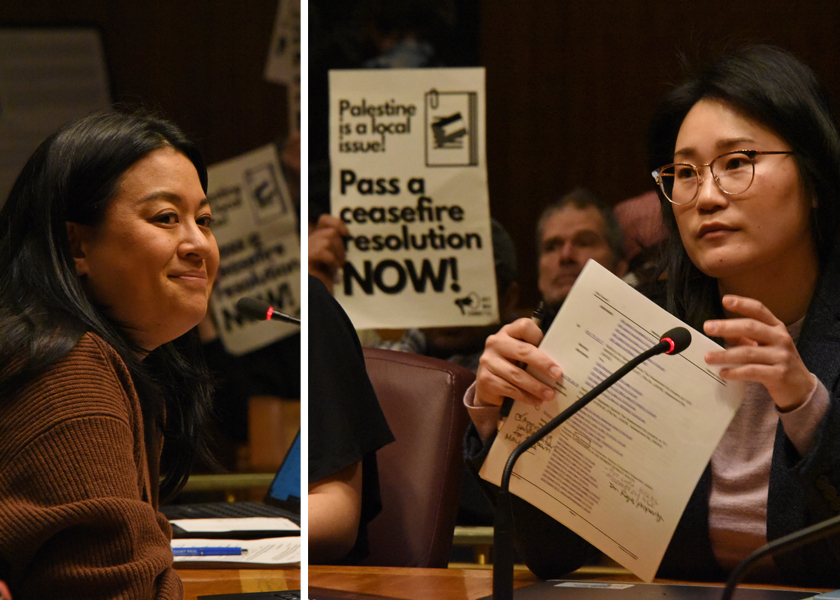
Much attention has been given to the all-women St. Paul City Council, elected in November and seated after an early January inauguration, due to the important firsts it represents. It is unique in several respects, in addition to the fact that its members are now all women. It is also a young group; all under age 40. Six are women of color. Four of the seven were elected for the first time to the Council.
Also unprecedented in city and state history is that the current council leaders, President Mitra Jalali, and newly-elected Vice-President HwaJeong Kim, are both Korean Americans. Jalali, who represents Ward 4, has an Iranian American father and a Korean American adoptee mother. Kim is a Korean adoptee.
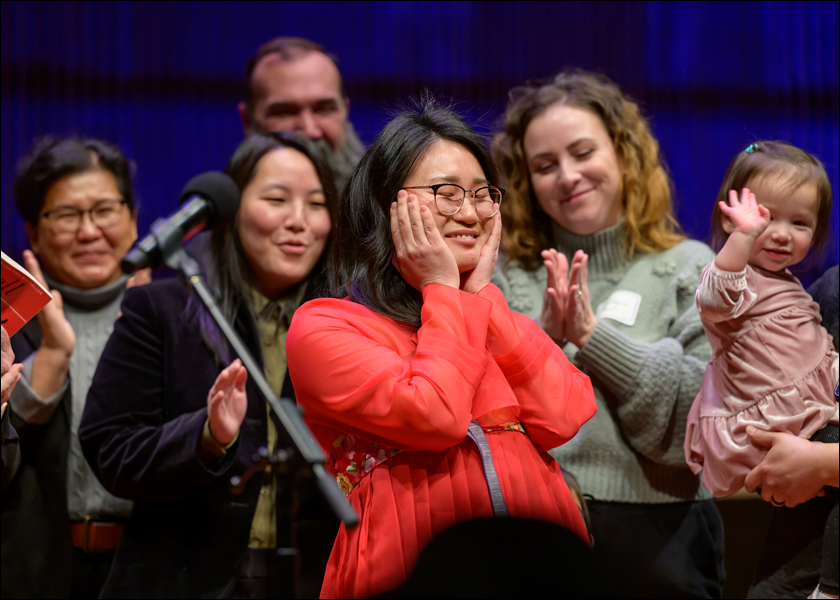
Kim, elected to represent Ward 5, is an activist/organizer and also a non-profit executive director and former legislative aide. She grew up in the small city of Independence, west of Minneapolis, and went to college at Hamline University. She remembers getting to know the local Korean American community early by participating in culture camps and other activities in the Twin Cities with other Korean American kids.
Kim describes her career in community organizing as starting from a humble place – being alarmed at a dangerous pedestrian crossing she and other pedestrians used at the corner of Rice Street at Lawson in the north end of St. Paul, the area she now represents. She had to use the intersection to get to her 2016 volunteer job at the Rice Street Library. It was a ‘somebody should do something’ moment, and propelled her to organize for change, and eventually to serve on the North End Neighborhood Organization. Through the neighborhood organization, there was eventually a re-design of the Rice Street corridor.
“Serving on my district council deepened my relationships with my neighbors and confirmed my belief that we become creators of change when we center ourselves and our communities in decision-making,” she wrote on her website.
After working on transit and public safety issues at the neighborhood and district levels, she got practical experience in pushing for causes she believes in while serving as the legislative aide for Ward 5 (2018 to 2021), and as a member of the city’s Planning Commission and its Zoning Committee. Important issues for Kim include fighting for “affordable housing, healthy communities, strengthening city services, and passing progressive policies that protect our most marginalized neighbors,” according to her bio.
She is also the executive director of the non-profit Minnesota Voice, which supports voting rights, voting access, civic engagement and education. Its programming includes activities such as candidate forums, organizational training, and voter education outreach.
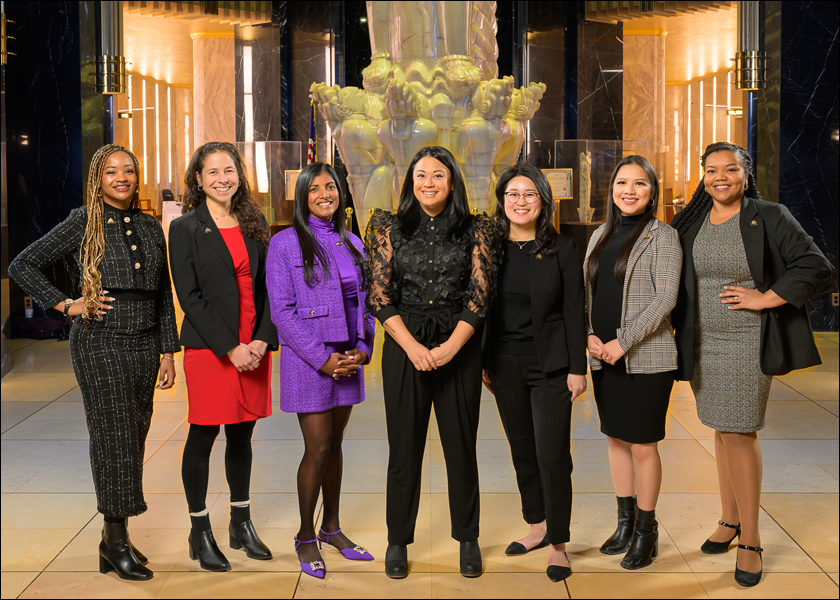
In early 2024, barely a month after the January inauguration, Jalali was still focussed on getting the newly-coalesced City Council up to speed. “There is an energy shift with the four new members, and it is a time of transition and a learning curve is underway,” she said.
Jalali was first elected through a special election in 2018, and re-elected for her first full term in 2019, then re-elected in 2023. She became Council president in January.
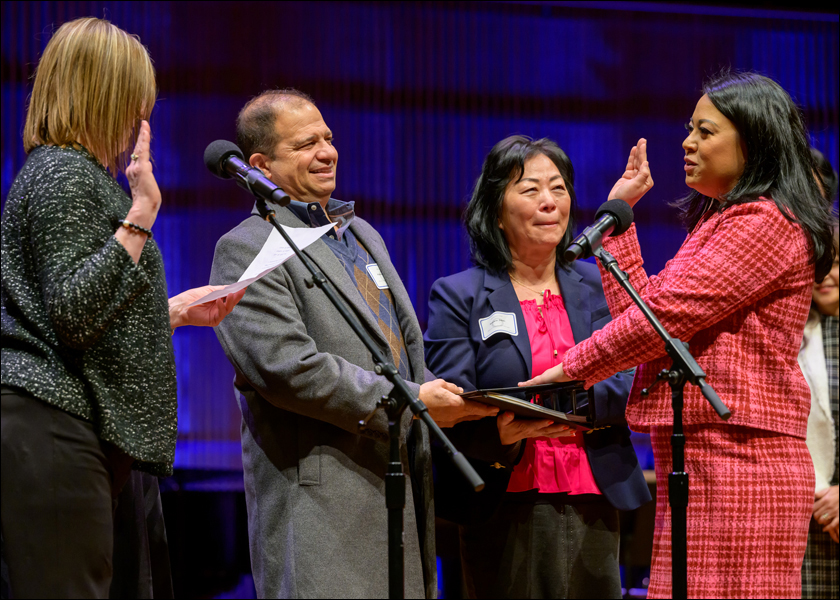
When first elected, Jalali was the youngest council member, the second woman of color to serve on the Council, and the only renter among the members. She has identified the City Council’s most pressing priorities as housing, sustainability/climate action, and community safety.
Jalali’s previous work includes being a teacher, community organizer, and policy aide and congressional staffer to U.S. Rep. Keith Ellison. Her priorities in office include affordable housing and homeownership, public safety and police accountability, building city sustainability including better and safer transit, and local economic development.
In February, while the Council was still getting acclimated, an activist group was attending its meetings and demonstrating in front of City Hall to call for a city resolution supporting a cease-fire of the war in Gaza. In pushing for a resolution, the group made some procedural errors that made their demands problematic for the Council to act on. At first, there was no proposed resolution before the Council, so there was nothing to vote on.
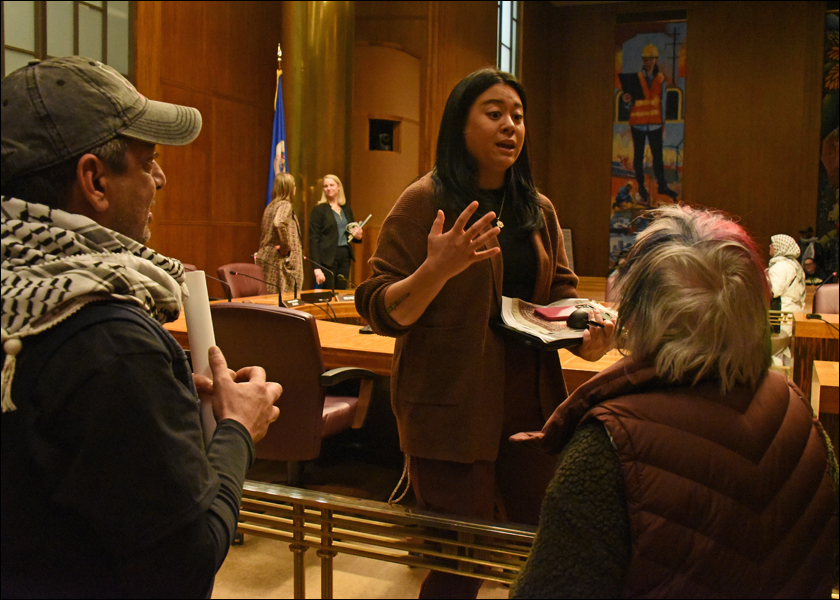
After the meeting adjourned February 21, Jalali spoke with some of the group members, expressing sympathy for their cause, and explaining that there is a process for getting a resolution before the Council, including documentation that the people asking for the resolution are actually St. Paul residents.
The group members were passionate, while Jalali was patient but firm. “You asked me a question and now you are talking over me while I’m answering. I am still speaking now,” she quietly told one group member. The women went temporarily silent.
The next week, at the end of the regular meeting, Councilmember Nelsie Yang asked to suspend the rules (concerning procedure for meetings) to introduce a resolution which was not on the agenda; Jalali refused and gaveled the meeting to a close before she could do so.
Yang reportedly later said that she could not find a council member prior to the February 28 meeting who would second her resolution. The situation was short-lived; the objection was largely about procedure and allowing time for Council members to review what would be vote on. Some members also expressed concern about the appropriateness of the City Council weighing in on matters of international policy.
Around the same time, several Minnesota cities, including Hastings, Columbia Heights and Minneapolis also passed some version of a Gaza cease-fire resolution. The resolution campaign is being employed as a tactic to express dissatisfaction with the Biden Administration’s policy on the war in Gaza.
At the March 6 regular meeting, the Council had a thoroughly-reviewed resolution, and was prepared to vote yes on it. The resolution was introduced by Councilmember Cheniqua Johnson (Ward 7).
Some of the Council members read prepared statements before the vote. Rebecca Noecker (Ward 3) remarked that, even after she learned how other Minnesota cities had passed similar resolutions, she had reservations about spending Council time on matters of international diplomacy which could distract from other pressing local issues before the Council. Noecker, who is Jewish, said that the attack on Israelis by Hamas hit her personally when her children lost their favorite teacher in the October 7 attack. Winding up her statement, she said she intended to vote in favor of the resolution.
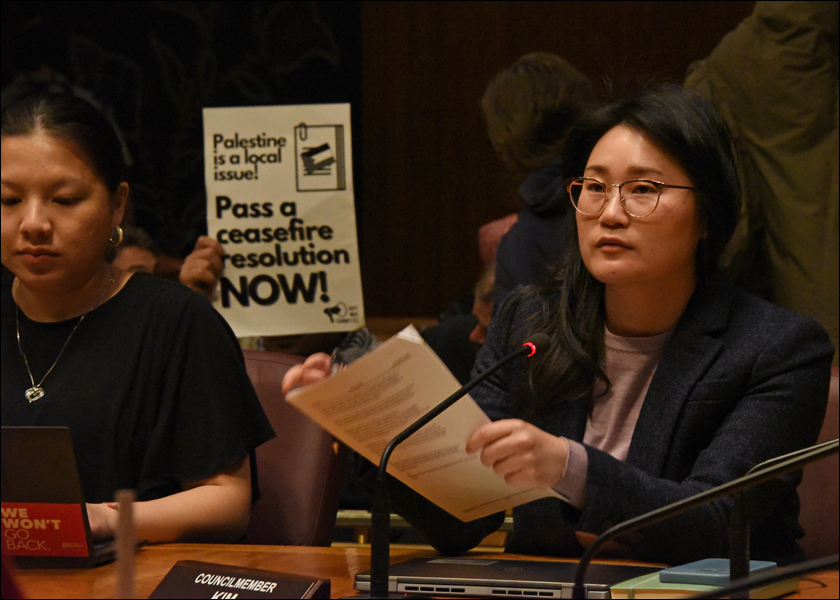
In her prepared statement, Kim compared the Gaza struggle to the 1910-1945 occupation of Korea by the Japanese. “My ancestors and the people of Gaza share common enemies, namely imperialism and colonization. When I see the history of Palestine, I see reflections of my own ancestral history. The intentional destruction of food systems, art, ecosystems, the environment, schools and temples; the destruction of safety, inherent culture, the erasure of sacred traditions and religion. My ancestors revolted against Japanese occupation and U.S. imperialism because they deserved liberation. Palestinians deserve the same.”
Jalali, who expressed support for the resolution, said that the City Council will be focused during the next year in a few broad areas of a much more local nature. One of them is housing, concentrated particularly on the quality and quantity of rental housing. Jalali said she wants to encourage local ownership of rental housing “to keep that revenue circulating in the community.” Another priority is how to apportion sales tax revenues to maintain streets and parks.
Making public transit safe and equitable is also needed, she said. The Council will be working with MetroTransit on its enforcement and safety plan, which is expected to increase ridership over time. There are federal funding dollars that need to be distributed across community programs from the Inflation Reduction Act and the American Rescue Plan, some of which can go to clean energy projects that will benefit city residents.
Looking at how an all-women, young, majority people-of-color City Council has been elected could be called a coincidence, but that would be missing a back story which points to some important demographic and political trends. Whether through organizations targeted to help emerging women candidates, outright endorsement of women candidates by women elected officials, personal mentorship, or just by being public good examples, women have been helping one another get elected in St. Paul and in Minnesota. It happened as a part of a nationwide trend.
Former City Council President Amy Brendmoen (Ward 5) endorsed Kim as a City Council candidate in 2023 when Kim was on the Planning Commission. Before that, Brendmoen also encouraged Councilmember Rebecca Noecker (Ward 2) for Council, who was first elected in 2016. That year, the headlines in January announced that there would be two women members on the Council – Rebecca Noecker and Jane Prince (Ward 7).
Jalali said she has also been encouraged by women who came before her and by women who told her they got the courage to run for office by watching her win elected offices. The trend is becoming a wave. In her experience, Jalali said, “Every year, our group of women leaders has grown.”
Kim thinks that an all-women Council was likely to happen sometime in the near future. Even before her own campaign, Kim heard the views of thousands of voters after working on many other campaigns, often going house to house talking on behalf of many progressive women, particularly women of color and LBGTQ women candidates. That the majority of Council are people of color also indicates a transforming St. Paul demographic. From the local angle, she said “seeing how the electorate has moved and changed, I believe we are witnessing a reckoning with whiteness.”


